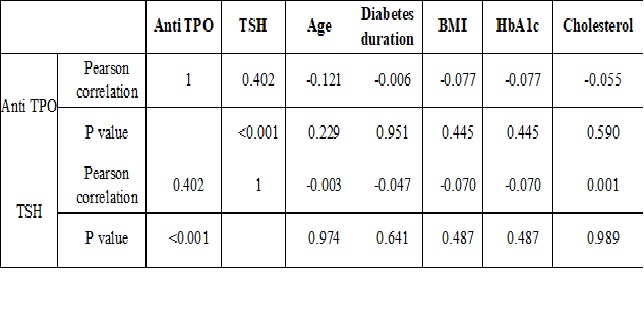A cross-sectional study of thyroid autoimmunity in women with type 2 diabetes: case for routine thyroid dysfunction screening
Abstract
Introduction: Subjects with diabetes have a higher prevalence of thyroid disorders compared to the general population. The reported prevalence of thyroid disorders is 10-24% in subjects with diabetes and 6 - 13% in subjects without diabetes. Auto immunity is held responsible for the increased prevalence of thyroid dysfunction in diabetes. Studies have proven the higher rates of autoimmune thyroid dysfunction in type 1 diabetes, but there is very little information regarding thyroid autoimmunity in type 2 diabetes.
Objective: To estimate the prevalence of thyroid dysfunction and thyroid autoimmunity in women with type 2diabetes.
Material and Methods: Samples for thyroid function test including free thyroxin (fT4), thyroid stimulating hormone (TSH) and thyroid peroxidase antibodies (anti -TPO) were obtained from 100 women with type 2 diabetes, attending the outpatient department of Karnataka Institute of Endocrinology and Research, Bangalore.
Results: Thyroid dysfunction was found in 42% subjects, where 36% had subclinical hypothyroidism and 6% had overt hypothyroidism. Anti - TPO positivity was seen in 30% of the subjects. Anti-TPO positivity was found in 24.1% euthyroid subjects, 33.3% subclinical hypothyroid subjects and 66.7% overt hypothyroid subjects. Significant positive correlation was observed between anti-TPO and TSH (p value <0.001*). No statistically significant association was found between thyroid dysfunction and age, BMI, Hba1c, and diabetes duration.
Conclusions: The prevalence of thyroid dysfunction is significantly high in women with type 2 diabetes. The most common abnormality is subclinical hypothyroidism and autoimmunity is the cause of thyroid dysfunction in large proportion of these subjects.
Downloads
References
Mirella Hage, Mira S. Zantout, and Sami T. Azar, “Thyroid Disorders and Diabetes Mellitus,” Journal of Thyroid Research, vol. 2011, Article ID 439463, 7 pages, 2011. https://doi.org/10.4061/2011/439463.
Palma CC, Pavesi M, Nogueira VG, Clemente EL, Pereira MD, Pereira LC, Pacheco FF, Braga TG, de Faria Bello L, Soares JO, dos Santos SC. Prevalence of thyroid dysfunction in patients with diabetes mellitus. Diabetology & metabolic syndrome. 2013 Dec; 5(1):58.
Kadiyala R, Peter R, Okosieme OE. Thyroid dysfunction in patients with diabetes: clinical implications and screening strategies. Int J Clin Pract. 2010 Jul; 64(8):1130-9. doi: https://doi.org/10.1111/j.1742-1241.2010.02376.x.
Duntas LH. Subclinical hypothyroidism: a misnomer in search of a new name. Thyroid. 2001 Apr; 11(4):361-2. DOI: https://doi.org/10.1089/10507250152039091.
Tunbridge WM, Evered DC, Hall R, et al. The spectrum of thyroid disease in a community: the Whickham survey. Clin Endocrinol (Oxf). 1977 Dec; 7(6):481-93.
Canaris GJ, Manowitz NR, Mayor G, et al. The Colorado thyroid disease prevalence study. Arch Intern Med. 2000 Feb 28; 160(4):526-34.
Hollowell JG, Staehling NW, Flanders WD, et al. Serum TSH, T(4), and thyroid antibodies in the United States population (1988 to 1994): National Health and Nutrition Examination Survey (NHANES III). J Clin Endocrinol Metab. 2002 Feb; 87(2):489-99. DOI: https://doi.org/10.1210/jcem.87.2.8182.
Perros P, McCrimmon RJ, Shaw G, et al. Frequency of thyroid dysfunction in diabetic patients: value of annual screening. Diabet Med. 1995 Jul; 12(7):622-7.
Kaeley N, Bhatia R, Dhar M, Verma SK, Ahmed S. Association of Thyroid Disorders and Type 2 Diabetes Mellitus–Beyond Coincidence-a Hospital Based Study From Sub-Himalayan Region. National J. Med. Allied Sci. 2015; 4(1):19-25.
Usha Menon V, Sundaram KR, Unnikrishnan AG, et al. High prevalence of undetected thyroid disorders in an iodine sufficient adult south Indian population. J Indian Med Assoc. 2009 Feb; 107(2):72-7.
Vanderpump MP, Tunbridge WM, French JM, et al. The incidence of thyroid disorders in the community: a twenty-year follow-up of the Whickham Survey. Clin Endocrinol (Oxf). 1995 Jul; 43(1):55-68.
Nwokolo I, Meludu C, Dioka E, Onah CE, Ikemefuna FO, Onyema-Ilo OB. The Prevalence of Thyroid Dysfunction and Thyroid Autoantibodies among Type 2 diabetic Patients in Nnewi, South Eastern Nigeria. JMSCR. 2014; 2:646-53.
Demitrost L, Ranabir S. Thyroid dysfunction in type 2 diabetes mellitus: A retrospective study. Indian J Endocrinol Metab. 2012 Dec; 16(Suppl 2):S334-5. doi: https://dx.doi.org/10.4103%2F2230-8210.104080.



 OAI - Open Archives Initiative
OAI - Open Archives Initiative


